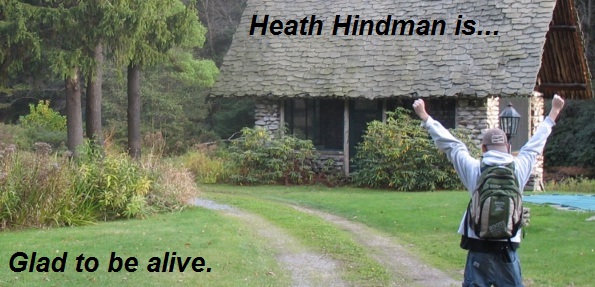This column is about games, I promise.
Lying on my back on the floor of my living room, I slowly raised my fist into the air. I had won. I was supposed to be dead by now, but I wasn't. I had just gotten home from the hospital, as a week earlier, an asthma attack robbed my body of its oxygen supply—as they tend to do—and I'd gone through what a doctor labeled a "simulated heart attack," meaning my heart freaked the hell out due to all that was going on. (This is not a joke.) My body was severely weakened, but I could still lift an arm, if only to prove I was alive.
What brought about my triumphant hand raising was my playlist's choice of music, which happened to be L'Arena by Ennio Morricone. While the song is older than I am, I had first been exposed to it in Kill Bill 2, spoilers of which come now. The song plays when Uma Thurman's character is in a coffin being buried alive. Using all of her strength, she fights her way out and crawls to freedom. I suppose somewhere in the back of my mind, hearing the music, I recalled the scene and connected myself to it. When I first saw the film, I liked that moment, but ever since that day in February of 2008, seeing it consistently evokes tears.

While not on par with the tragedies that some have experienced, what I went through left me a different person. The experience of losing my oxygen followed by my consciousness still messes with my subconscious; there's a chance I'll get a little bit misty-eyed talking about things like drowning, suffocating, or otherwise not being able to breathe. Too often, I'll break down and start crying, out of nowhere. Sorry for dumping a load of baggage on you—I'm trying to describe the power of my tie to L'Arena. I'll stop there.
My eyes now opened to just how awesome Morricone's work can be, I sought out other pieces of his music, ultimately finding a "Very Best of Ennio Morricone" CD. I listened to this collection and quickly fell in love with a track called Sacco e Vanzetti. I didn't think much of it beyond it being a great song that appeared regularly on my playlist. Then the Metal Gear Solid: Ground Zeroes trailer came out, and I heard something all too familiar. The tune was the same as a song I knew, but the words were in English for some reason.
"Here's to you, Nicola and Bart.
Rest forever here in our hearts.
The last and final moment is yours.
That agony is your triumph."
It was an English version of Sacco e Vanzetti. What the heck was a Morricone song doing in Metal Gear? I wasn't complaining, but suddenly, I had to know more. Internet searches led me to the story of the two men whose names the song title bears: Ferdinando Nicola Sacco and Bartolomeo Vanzetti. I spent a whole day (luckily a holiday) digging up information, reading various accounts of their bogus, unjust prosecution, then watching a documentary about them. Coincidentally, I also found out that a special version of the song was in Metal Gear Solid 4, which I have yet to play. (Soon, soon.)

Naturally, the Morricone connection led me to watch the Kill Bill scene and cry about it, seeing myself in the coffin as I always do now, but the main theme of the day was learning about these two interesting men and their losing battle against a corrupt judicial system. It made me thankful that such cases seem to be infrequent today, yet angry that instances of bias, prejudice, evidence tampering, and false testimony still occur. The minute we violate the rights we grant all people, and ask in return, is the minute we become the very enemies causing the fear to begin with.
Look at what happened here. I became just a little bit more informed about one of the most controversial legal cases in American history, and in doing so, also learned quite a bit about society at the time. This was all thanks to a video game. I grew through a streak of tangential learning started by a game trailer. This is not an isolated incident; happens all the time.
While video games (and for that matter, all forms of media) must take many liberties with science and history, a lot of them inspire us to pursue real information on the subject. The information age is upon us, and finding these facts and bits of history are easier than they've ever been in the history of history. Oftentimes, a game might not get things exactly correct, but it doesn't have to in order to educate the masses a little bit. You know that part of Call of Duty 4 when the nuke goes off and your chopper crashes, killing you? That's some heavy stuff. "War is hell" might be a common saying, but things like this help demonstrate the grim reality that is armed combat. Will Call of Duty or Medal of Honor actually teach you a lot about warfare? Well, no, and they're not intended to. The fact remains, however, that despite the stretches they must take, a lot of games are at least built upon a foundation of reality. They're not the best source of real knowledge, but they can tangentially teach us things.

As a college kid, I was a regular war monger. Anyone messed with the US in the slightest way, pfft, I'd have cheered for a military strike. Not anymore. I've grown up, not just because of time passing and, luckily, not because of going through a war myself, but thanks to second-hand education of documentaries, TV shows, and yes, even video games. The first gives us hard facts, the second gives us a third-person look at what certain stories and events may be like, and the latter lets us live our own fictionalized version of an experience. Reality they might not be, but valuable they can become.
Ever gone to Google, Wikipedia, or your bookshelf in search of information after having made a discovery in a game? You've experienced tangential learning through a game. People could play God of War and feel prompted to look up certain characters in Greek mythology, then find out what the ancient people really said of these now-legendary characters. One might look up the real effects of a nuclear explosion after playing Fallout or a modern shooter, grab an encyclopedia to see if a pig can actually jump seven feet into the air like it can in Tokyo Jungle, or discover some of the classical era's greatest music through Eternal Sonata. Someone might play Heavy Rain and be reminded not to take his/her children for granted. The possibilities are endless, and the best thing is, going through these virtual experiences has almost no chance of killing you or ruining your life like the real thing could.
I am using Journey in communication lessons, because it's such an amazing example of ways non-verbal messages can be transferred, and how personal interpretation of messages and our surroundings can vary from person to person, among other things.
Playing Valkyria Chronicles, which takes place in a super-fictionalized re-imagining of World War II made me realize that I knew plenty about World War II, but very little about World War I, so I watched a documentary on YouTube. I learned so much.

ICO gave my at-the-time platonic friend a message I couldn't formulate on my own. Unsure of how to tell her what was up, I sent a copy to a girl I had feelings for and hoped for the best. This past summer was our fifth wedding anniversary.
When I was in elementary school, pieces of educational software lit up my days. Number Munchers, Treasure Math Storm, Reader Rabbit, and others helped basic facts stick with me. It was the same for my wife. As a kid, her mom brought home The Magic Schoolbus game, and it taught her things she wouldn't encounter until high school biology, as well as things she never learned anywhere else—true things that are useful and important to know.
There are problems with this, like propaganda games that portray a situation that has very little resemblance of reality. Call of Juarez: The Cartel is among the worst games ever made in that regard. Thankfully, for every lie-filled crapfest like that, there's something like a Metal Gear Solid to give us real (and unsettling) facts at the end.

Not all games have anything to teach us directly, and that's fine. Many do, however, and I feel that this is unfairly overlooked in favor of the uglier side, almost to the point of total exclusion from our thoughts and discussions about gaming. Beyond straight-on teaching of facts or history, games are an amazing springboard into tangential learning. They make us curious about certain parts of the world around us, and in turn, some players will go out and seek fulfilling knowledge or uplifting experiences. A simple song from a video game trailer helped me spend my day off better than I could have planned to. I was entertained, I felt a bevy of emotions, and I ended that day a better person than I was when it began. Games have made me a better person.
Stay perpetually improving, my friends.







